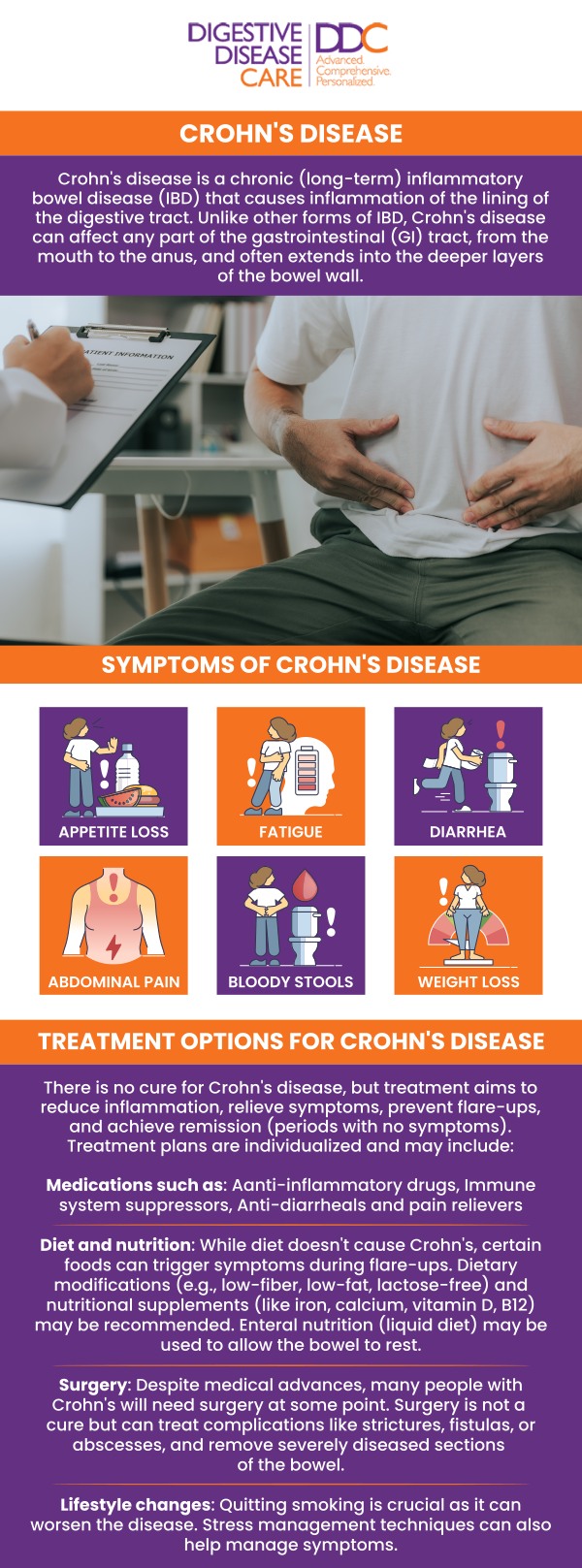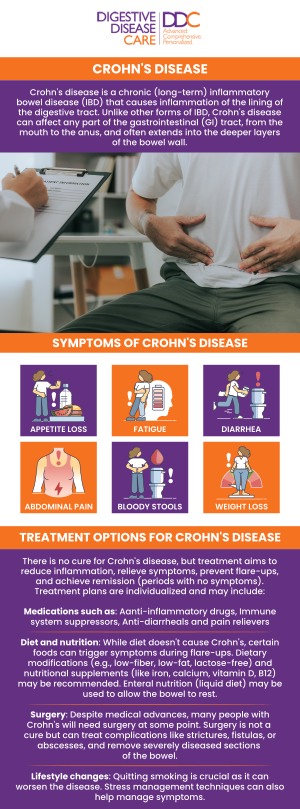Common Questions to Asked About Crohn’s Disease Treatment
Crohn’s disease is a common type of inflammatory bowel disease and is considered to be a dysfunctional immune response. There are many different symptoms and complications associated with Crohn’s disease, making management of the disease essential in maintaining the patient’s health and daily comfort. Visit Digestive Disease Care to get comprehensive and specialized care from a board-certified gastroenterologist. For more information, contact us today or schedule an appointment online. We have convenient locations to serve you in Babylon NY, East Setauket NY, Forest Hills NY, Jericho NY, Lake Success NY, Melville NY, Mineola NY, Massapequa NY, New Hyde Park NY, and Riverhead NY.




Table of Contents:
What exactly is Crohn’s disease?
What are the types of Crohn’s disease?
How common is Crohn’s disease?
What are the signs and symptoms of Crohn’s disease?
Is Crohn’s disease treatable?
Crohn’s disease is an autoimmune disease that is chronic and most frequently affects both the small and large intestines of the digestive tract but can affect any part of the digestive tract between the mouth and the anus. It is one of the more common types of inflammatory bowel disease, and it causes irritation and inflammation all along the digestive tract, causing significant abdominal pain, fatigue, weight loss, and insufficient nutrition among patients. Since Crohn’s disease is a chronic condition, treatment means management, as the condition cannot technically be cured.
Since Crohn’s disease can affect anywhere along the digestive tract, there are several different types of conditions that are classified depending on where along the digestive tract is experiencing inflammation, irritation, or swelling. The types of Crohn’s disease include:
Colitis: Inflammation located within the large intestine.
Gastroduodenal: Inflammation within the stomach and upper portion of the small intestine.
Ileitis: Inflammation within the small intestine.
Ileocolitis: Inflammation within the lower portion of the small intestine and part of the large intestine.
Jejunitis: Inflammation that develops in patchy areas throughout the upper portion of the small intestine.
Perianal disease: Inflammation that occurs around the anus, often resulting in fistulas and abscesses.
Crohn’s disease is most prevalent among North Americans and Europeans. Anywhere from 6 to 8 million people globally have been diagnosed with Crohn’s disease, with around 780 thousand Americans currently being affected by the disease. Individuals who are between 15 and 35 years of age are most commonly affected by the disease, often receiving the diagnosis by the age of 20. Crohn’s disease also increases in frequency among individuals who are between 60 and 80 years of age.
Crohn’s disease comes with a variety of symptoms, all of which can vary in severity or frequency, and will develop differently for each individual. It is common for patients to experience chronic symptoms unless the symptoms are being properly managed by a health care provider, and to experience worsened symptoms during “flare-ups”. The symptoms of Crohn’s disease can also affect not just the digestive tract, but also other parts of the body. The most common symptoms that are experienced along the digestive tract include:
• Blood in the stool
• Cramping or pain within the abdomen
• Infections or abscesses that develop around the anal canal
• Chronic diarrhea
• Ulcers that develop around the mouth and gums
• Unexplained weight loss and loss of appetite
• Chronic fatigue and fever
These symptoms can develop gradually or come on suddenly and will range quite a bit in severity.
Common symptoms of Crohn’s disease that can develop outside of the digestive tract include:
• Inflammation around the eyes and of the bile ducts
• Rashes
• Arthritis, osteoporosis, or joint pain
• Kidney stones
• Skin tags (typically developing around the anus)
Since Crohn’s disease is a chronic condition, there is not yet a cure so treatment is sought through long-term symptom management. Individuals diagnosed with the disease can experience a wide range of symptoms, making an effective treatment plan look a bit different from person to person depending on the severity and types of symptoms that are being experienced, with the treatment plan also being affected by their general health and lifestyle. There are a few different methods of symptom management available, including medication such as steroids and anti-inflammatory medications to help reduce inflammation. Other medications that are sometimes used include immunosuppressants and biologics, which work to force the immune system to calm down, reducing the severity of symptoms. Antibiotics, pain medications, and antidiarrhea medications are also commonly prescribed for patients diagnosed with Crohn’s to further manage their symptoms, particularly during flare-ups.
Symptoms of Crohn’s disease can also be heavily influenced by diet, so making some changes to the patient’s diet in regards to nutrition can provide significant symptom relief, with some patients being recommended to use feeding tubes if they are unable to get all of the necessary nutrients through their diet alone. Additionally, some surgical procedures may be recommended to help provide symptom relief or to treat complications caused by Crohn’s disease. For more information, contact us or schedule an appointment online. We have convenient locations to serve you in Melville NY, New Hyde Park NY, Forest Hills NY, Jericho NY, Mineola NY, Lake Success NY, Babylon NY, East Setauket NY, Massapequa NY, Riverhead NY and BEYOND.

Check Out Our 5 Star Reviews


Additional Services You May Like

Additional Services You May Like
- Abdominal Pain
- Acid Reflux
- Barretts Esophagus
- Bloating
- Capsule Endoscopy
- Celiac Disease
- Colon Cancer Screening
- Colonoscopy
- Constipation
- Crohns Disease
- Diarrhea
- Diverticulitis
- Esophageal PH Monitoring
- Fatty Liver
- Fibroscan
- Gallstones
- Gastroenterologist
- Gastric Chest Pain
- Gluten Intolerance
- Hemorrhoid
- Hemorrhoid Banding
- Hepatitis
- Irritable Bowel Syndrome
- Lactose Intolerance
- Pancreatitis
- Polyps
- Rectal Bleeding
- Stomach
- Ulcerative Colitis
- GI Urgent Care





